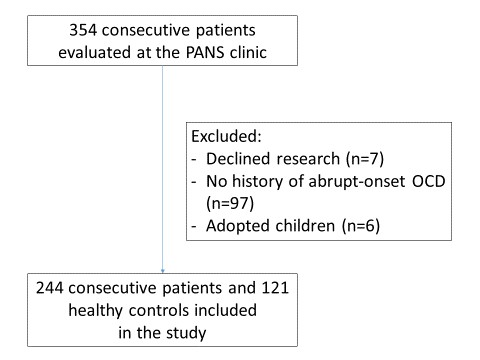Session Information
The 2020 Pediatric Rheumatology Symposium, originally scheduled for April 29 – May 2, was postponed due to COVID-19; therefore, abstracts were not presented as scheduled.
Date: Saturday, May 2, 2020
Title: Poster Session 3
Session Type: ACR Abstract Session
Session Time: 4:15PM-5:15PM
Background/Purpose: Recent epidemiologic studies have reported increased rates of immune-mediated comorbidities among first-degree relatives of patients with OCD and tic disorders.(Mataix-Cols et al., Mol Psychiatry 2018; Westwell-Roper et al., Mol Psychiatry 2019) However, these studies were limited by the lack of healthy control data, and they asked for a replication study. In this study, we aimed to compare the prevalence rates of immune-mediated diseases in siblings and parents of children with abrupt-onset OCD and healthy controls. We define abrupt-onset OCD as sudden-onset OCD which develops to full symptom severity within 72 hours, and is diagnosed by a psychiatrist. Many children diagnosed with this type of OCD also meet the diagnostic criteria of Pediatric Acute-onset Neuropsychiatric Syndrome (PANS) which is characterized by abrupt-onset OCD and/or severe eating restriction, and other neuropsychiatric symptoms.(Swedo et al., Pediatr Therapeut 2012)
Methods: This was a retrospective cross-sectional study approved by the IRB. We included patients from our multidisciplinary PANS clinic between September 2012 and June 2019, who presented with abrupt-onset OCD. We excluded adopted patients with unclear history. We also recruited healthy children of the same age range, from the same community. Patients’ and healthy controls’ families complete an intake questionnaire which queries family history of immune-mediated diseases and psychiatric disorders. From the questionnaire answers, we examined their demographic characteristics and prevalence rates of OCD and immune-mediated diseases in their first-degree relatives (sibling and parents) by descriptive statistics and appropriate tests like Chi-square or Fisher’s exact tests.
Results: This study included 244 consecutive patients and 121 healthy controls (Fig.1). Our study patients had a mean age of symptom onset at 8.6 (SD 3.6) years and a mean age of clinic presentation at 10.6 (SD 4.2) years; 61% were males and 78% were White; Mean CYBOCS at initial clinic presentation was 17.3 (SD 10.0). Healthy controls presented to us at older age (mean 12.4, SD 4.4 years), and a lower proportion (52%) was White. Otherwise, patients and healthy controls were demographically similar. We found OCD more prevalent in siblings (16% vs 1%, p< 0.001) and parents of our patients (12% vs 3%, p< 0.01) than those of healthy controls (Table 1). As well, siblings and parents of patients reported more immune-mediated diseases than those of healthy controls with statistical significance after adjusting for race and age at clinic presentation (adjusted OR 2.80, 95% CI, 1.64-4.76, p< 0.001). The study was underpowered to show statistically significant differences in each specific disease.
Conclusion: Our findings of an increased risk of having immune-mediated disorders in first degree relatives of our patients with early abrupt-onset OCD are in line with other studies looking at the general OCD population. When seeing patients with both abrupt-onset OCD and idiopathic OCD, we should carefully evaluate families for immune disorders.
To cite this abstract in AMA style:
Chan A, Phu T, Farhadian B, Willett T, Silverman M, Tran P, Thienemann M, Frankovich J. Familial Clustering of Immune-mediated Diseases in Children with Abrupt-onset OCD [abstract]. Arthritis Rheumatol. 2020; 72 (suppl 4). https://acrabstracts.org/abstract/familial-clustering-of-immune-mediated-diseases-in-children-with-abrupt-onset-ocd/. Accessed .« Back to 2020 Pediatric Rheumatology Symposium
ACR Meeting Abstracts - https://acrabstracts.org/abstract/familial-clustering-of-immune-mediated-diseases-in-children-with-abrupt-onset-ocd/


